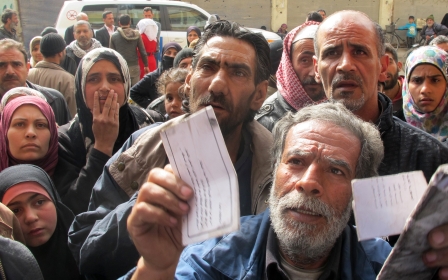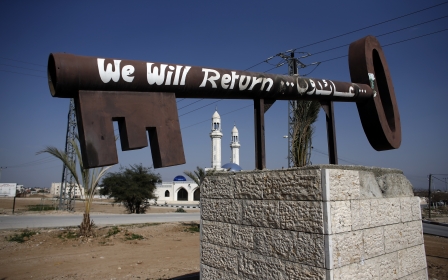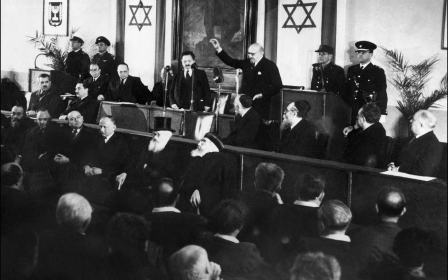Sustaining conflict: Apathy and domination in Israel-Palestine

It’s not until halfway through this study that the reader twigs that the author, Katherine Natanel, isn’t Jewish, but a neutral investigative analyst spending the better part of a year in the self-proclaimed Jewish state. Living in Tel Aviv as if she were an Israeli Jew brings privileges that we in the West take for granted.
One benefit of this is the entrée to the very neighbourhoods that should be sympathetic to the Palestinians’ plight. And if you ask them if they have a problem with the Israeli occupation, they’ll generally answer in the affirmative.
The glue that holds Jewish Israeli society together is a mixture of “fraternity, security, and modernity,” with each term looking into the chilling abyss of its polar opposite. Jewish Israelis are seen to want to bond with themselves in their own perceived culture, although the exclusion of non-Jews is barely questioned here. Safety is a reasonable goal, although it’s only achievable by suspecting that there’s a constant hulk, skulking round the next corner. And being up-to-date rids the community of a perceived weakness from an earlier era in their former countries of origin.
These three pillars of Zionism need constant victory over real or imagined assailants. And Zionism itself thus perpetuates an easily malleable norm. Author Natanel is clear here that the natives’ patriotism is now a self-perpetuating saga of elusive victory over persecution.
You’d think that these educated, left-leaning, "pro-peace" communities would have cause to question their entitlement. As the writer relates, there is a contradiction, which Jewish Israelis, being human, are wont to wilfully disconnect from normal life as you and I know it. They seek Western rights and aspirations and, since life isn’t easy, why not focus on jobs, families and consumer goods?
High fuel prices cannot generate public protest because economic corruption just isn’t a security issue. In fact, there’s seemingly always a counter-argument justifying an injustice. Bedouin women are typecast as gender slaves, so they and their menfolk don’t deserve human rights. West Bank sweets are somehow untouchable, but only because they’re too sweet!
There’s a fatigue that sets in due to the “abnormal” situation when compared, as they are, with American cities. This blankets the bodies and brains of even young Palestinian rights activists when they then grow up and have households. The writer sees this as an “active disengagement” from the lower classes, whether they’re African immigrant Jews or Arabs, whose presence and status are tolerated with a seeming generosity.
Taking a feminist approach, Natanel highlights the comparatively backward social gender mores when compared to those in Britain. And this is most obvious in the militarisation of the country itself. Even though women serve in the IDF for two years (and young men for three), the women aren’t directed to combat units. Therefore, women, like many Jewish immigrants, are culturally compelled to conform to the civilian social-shouting rooted in the macho army. Even in Ha’aretz-reading, Labour-orientated settings, “you can’t be polite”.
Apparently, gals below retirement age aren’t part of the dwindling anti-occupation street demonstrations because it’s the woman’s role to make dinner.
And the co-opting of cuisine, taken from Palestinian plates, is also seen as second-class. Women cook at home and Palestinian males do the kitchen work in Jewish-Israeli restaurants. Dining out at Arab-Israeli establishments is seen as a brave step, but it’s not for social mixing – similar liberal white Americans venture into the African-American neighbourhoods for fried chicken or barbecued ribs only. Therefore, the popularity of hummus in mainstream Israel isn’t merely invading and occupying culture, it also serves as a badge of supposed enlightenment, with no risk of actual human contact.
Unlike in the USA, where the 1940s racial desegregation of their armed forces helped give a kick-start to the civil rights struggle, in Israel, there’s not much of a melting pot. And certainly not in the IDF.
Many patterns of behaviour circulate back to military conscription though. Borrowing a phrase wielded by our own police and any home secretary, this is militarism by consent. If your own offspring serve in the IDF you become more normal somehow. If you yourself oppose this, you consider yourself lucky to be open-minded in accepting that your 18-year-old can opposes your sentiments, and you in any event join the "we-worry-about-our-kids" club.
Any self-exclusion from this makes you ochrei Israel, one of the haters of Israel, and you’ll never be taken seriously again.
Rabbis for Human Rights are shown to be keen to help even privileged West Bank Palestinian families harvest their olives, but this a bit symbolic. For the activists, they succeed in a minor social transgression and the recipients of their support also get some good public relations in the foreign media. Some young Israelis contribute muscle to such anti-occupation activism for “adventure, for tourism…for righteousness,” and then they’ve done their bit.
Is this too cynical? The weekly Tel Aviv high street demo by the international, anti-militarist Women in Black takes place next to an animal rights group trying to find homes for puppies. And as election results of the past few decades have shown, the left has been ground down and dissipated as bad government has added more floor space to its tower of power.
This book’s narrative isn’t an easy one, with an excess of academic jargon, even for a title published by an academic press. There’s a surfeit of author reference, which one expects in the first chapter of any academic work, but in this case Natanel’s dogmatic devotion to detail doesn’t let up. This is certainly not journalism but, while not an easy read, it’s a sociological assessment of the present-day Jewish Israeli left and its total integration within the Zionist project.
But there are surprises along the way, if you stick with it. Settlers apparently face discrimination by the Tel Aviv cosmopolitan middle class. Black Jews don’t appreciate political support from Ashkenazi (European) Jews. Palestinian rights demos are organised and led by men.
It as if the Jewish Israelis have become religious converts, away from their inherited faith and now devoted to fear.
"Sustaining Conflict; Apathy and Domination in Israel-Palestine", written by Katherine Natanel and published by University of California Press (2016), is available in Amazon.
New MEE newsletter: Jerusalem Dispatch
Sign up to get the latest insights and analysis on Israel-Palestine, alongside Turkey Unpacked and other MEE newsletters
Middle East Eye delivers independent and unrivalled coverage and analysis of the Middle East, North Africa and beyond. To learn more about republishing this content and the associated fees, please fill out this form. More about MEE can be found here.




